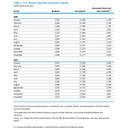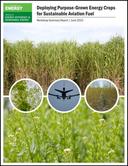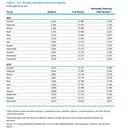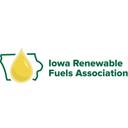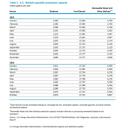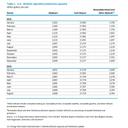Feedstocks
Total U.S. operable biofuels production capacity fell slightly in December, according to data released by the U.S. Energy Information Administration. Total feedstock consumption was up when compared to both the previous month and December 2022.
Vertex Energy Inc. released fourth quarter financial results on Feb. 28, reporting that the company’s renewable diesel production unit at its refinery in Mobile, Alabama, produced 3,786 barrels per day during the three-month period.
Yield10 Bioscience grants global license to VISION Bioenergy Oilseeds for herbicide tolerant camelina cultivated for the production of biofuel feedstock
Yield10 Bioscience Inc. on Feb. 14 announced it has granted VISION Bioenergy Oilseeds LLC a global license to certain proprietary varieties of camelina sativa for the production of feedstock oil for biofuels.
The U.S. Department of Energy Bioenergy Technologies Office announced $29 million in funding to drive research, development, and demonstration of low-carbon-intensity, purpose-grown energy crops critical to accelerating a clean energy economy.
Researchers at U.K.-based De Montfort University Leicester (DMU) have pioneered a new manufacturing process which could make the creation of biofuel from waste cooking oil faster and more efficient.
The U.S. Department of Energy Bioenergy Technologies Office has named the 15 teams advancing as finalists in the AlgaePrize 2023–2025 competition. Each team will receive $10,000 to support research projects over the next 16 months.
The U.S. Department of Energy’s (DOE) Bioenergy Technologies Office (BETO) released a summary report following its Deploying Purpose-Grown Energy Crops for Sustainable Aviation Fuel (SAF) workshop held June 6-7, 2023, in Kansas City, Missouri.
The USDA maintained its projection for 2023-’24 soybean oil use in biofuel production in its latest World Agricultural Supply and Demand Estimates report, released Feb. 8. The agency reduced its forecast for soybean oil prices.
Loamist, a climatetech startup, has announced its pre-seed financing and emergence from stealth mode, marking the public release of its Biomass Explorer product, a tool that addresses the critical challenge of accessing biomass.
Total U.S. biofuel operatable production capacity was up slightly in November, with gains for ethanol, according to data released by the U.S. Energy Information Administration on Jan. 31. Total feedstock consumption was down slightly from October.
Sens. Jerry Moran, R-Kan.; Amy Klobuchar, D-Minn.; Joni Ernst, R-Iowa; Tammy Duckworth, D-Ill.; and Chuck Grassley, R-Iowa, on Jan. 22 introduced the Farm to Fly Act, a bill that aims to accelerate the production and development of SAF.
The USDA increased its forecast for 2023-’24 soybean oil use in biofuel production in its latest World Agricultural Supply and Demand Estimates report, released Jan. 12. The price of soybean oil was revised down.
A study released by Decision Innovation Solutions on Jan. 11 shows the Midwest stands to benefit greatly if the SAF goal of 35 billion gallons by 2050 is met, as two of the most likely SAF feedstocks would be soybean oil and corn.
U.S. operable biofuels production capacity expanded in October, with gains for both renewable diesel and biodiesel, according to data released by the U.S. Energy Information Administration on Dec. 29. Feedstock consumption was also up.
The USDA recently awarded two Delaware State University researchers a three-year just under $300,000 grant for a project that could leverage the properties of microalgae toward energy and cancer treatment purposes.
The U.S. DOE Bioenergy Technologies Office has announced its notice of intent to issue a funding opportunity announcement that will drive R&D of low-carbon, purpose-grown energy crops leading to the deployment of clean energy technologies.
In research supported by the U.S. DOE Bioenergy Technologies Office, a team of scientists examined the unique properties of phosphorus uptake in the algal strains living in the Revolving Algal Biofilm (RAB) systems.
BDI-BioEnergy International’s Hermann Stockinger chats with Biodiesel Magazine about global feedstock trends, dynamics and observations.
CoBank’s Knowledge Exchange on Dec. 14 released a report focused on forces that will shape the U.S. rural economy next year. The report predicts that both ethanol producers and soybean crushers will benefit from rising demand for biofuels in 2024.
Starting as a family owned business 70 years ago, Neste-owned Mahoney Environmental collects and processes UCO from 80,000 businesses, sending it on to ultimately be used for renewable fuel production.
Continually pivoting to stay competitive and grow since its founding in 2008, Green Energy Biofuel has no intentions of stopping.
2024 North American SAF Conference & Expo now accepting abstracts
SAF Magazine in collaboration with CAAFI, has announced the 2024 North American SAF Conference & Expo will take place Sept. 11-13, 2024, in St. Paul, Minnesota. The event is accepting abstract submissions through May 10.
The USDA maintained its forecast for 2023-’24 soybean oil use in biofuel production in its latest World Agricultural Supply and Demand Estimates report, released Dec. 8. The expected price of soybean oil was revised down.
Conestoga to host SAFFiRE cellulosic ethanol pilot plant
Conestoga Energy and SAFFiRE Renewables LLC announced on Nov. 16 their agreement for Conestoga to host SAFFiRE’s cellulosic ethanol pilot plant at Conestoga’s Arkalon Energy ethanol facility in Liberal, Kansas.
The USDA maintained its 2023-’24 forecast for soybean oil use in biofuel production in its latest World Agricultural and Supply Estimate report, released Nov. 9. The agency’s estimate for 2022-’23 soybean oil use in biofuel production was revised up.
The USDA on Nov. 9 announced 2023 soybean production for beans is currently forecast at 4.13 billion bushels, up 1 percent from the October forecast, but down 3 percent from last year, according to the agency’s latest Crop Production report.
Novozymes, a global leader in biosolutions, marks a significant milestone in the renewable diesel and SAF industry with the launch of Quara LowP, an enzymatic solution designed to transform the feedstock pre-treatment process.
VISION Bioenergy Oilseeds and Makhteshim Agan of North America Inc. (ADAMA) on Nov. 7 announced they have entered into a joint development agreement to bring to market a suite of new crop protection solutions for camelina growers.
Rep. Max Miller, R-Ohio, on Nov. 7 introduced the bipartisan Farm to Fly Act, which aims to create new markets for U.S. agricultural products and strengthen domestic production of sustainable aviation fuel (SAF).
U.S. biofuels operable production capacity was up slightly in August, with a small gain for ethanol, according to data released by the U.S. EIA on Oct. 31. Feedstock consumption was down slightly from the previous month.
Advertisement
Advertisement

